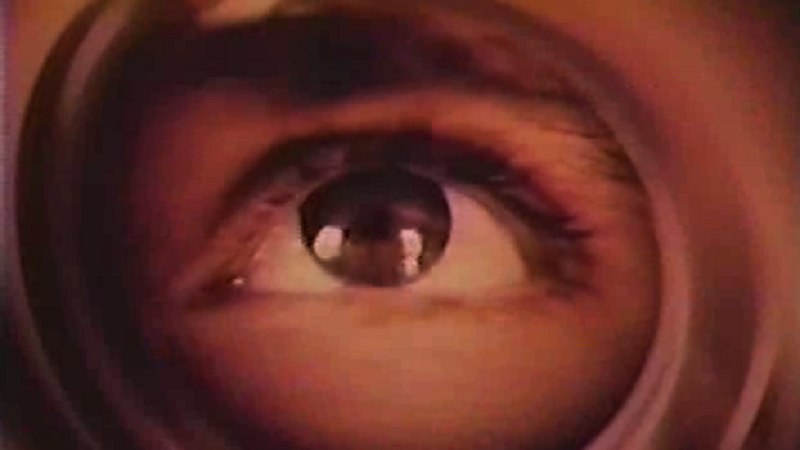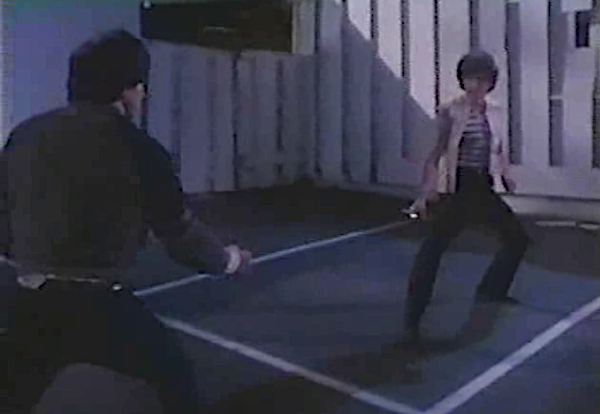Somewhere among the various monikers that have been used to describe America – “land of opportunity” and “nation of immigrants,” etc. — is its place as the world’s premier exporter of popular culture. Perhaps no single place in America encapsulates all of these descriptors as well as Hollywood. One could argue about the problematic, abusive, and exclusive systems on which it has relied to manufacture its end product, but few would debate Hollywood’s literal and symbolic position as an industrial hub for entertainment, and a dreamland for creatives across the world. George Pan Andreas is one of those dreamers, someone with nearly as much reverence for the old gods of Hollywood as the mythological gods of his homeland of Greece.
Born George Andreas Panoussis in 1941, he emigrated to the United States in the early 1960s and became an American citizen in 1979. A screen acting career that began with a run of sporadic television roles in the 1970s trailed off by the end of the decade. According to biographical details from IMDb and his official website, he was involved in theatrical productions on Broadway and off-Broadway as a leading actor, and even claims “Golden Age” RKO star Ginger Rogers as a godmother. In the intervening years between his creative output, Pan Andreas has made a career as a real-estate developer and property owner, even purchasing performance theaters around Los Angeles to feature lower-budget productions and offer acting classes. By most indications, Pan Andreas has a sincere love for show business, deep in the bone.
Cinematic vanity projects are typically the result of a prolific performer cashing in whatever industry cachet they’ve accumulated so far to explore the border town where their abilities, their interests, and some acceptable standard of quality meet. Think about Sylvester Stallone riding the wave of goodwill generated by ROCKY to direct, write, and star in PARADISE ALLEY. Steven Seagal went from his breakthrough in UNDER SIEGE but then dropped big hints about his eventual decline by starring in and directing ON DEADLY GROUND. Jean-Claude Van Damme effectively did a retread of his career-making BLOODSPORT when he made its classy, story-driven cousin, THE QUEST.
Umm … BATTLEFIELD EARTH.
It’s rather odd then, that Pan Andreas followed up on his run of minor television roles several years after the fact and made his cinematic debut with an action vanity project all his own, directing himself in the lead role, from a screenplay he wrote, using money from who-knows-where, to release 1985’s CRIME KILLER through his own production company, GPA International.
He plays Zeus, a hardened but heroic cop that the film’s titular song leads us to believe is “the man to have around,” but is also “alone as a man,” and is subsequently “alone in the night, wanting to love but having to fiiiiiiight.” You get the idea.
During the warehouse raid that opens the film, Zeus is stabbed, and his partner, Willy (David Dominguez), is shot and later perishes. Zeus gets swift revenge on the perpetrators, but he also kills two crooked cops who arrive on the scene, initially believing Zeus dead. (Somewhere in this chaos, supposedly, is Brandon Lee making his uncredited film debut – and if you can identify him, then congrats! Your super-power is night vision). Zeus walks away from this mess dejected over the death of his partner but equally angry, repeatedly asking “why did you go soft?!” in Willy’s final moments.
Due to political pressure over the botched bust, Zeus is forced to hand in his badge during a heated confrontation with his chief (Leo G. Morrell) where he screams aloud the laundry list of abuses he’s taken in the line of duty, which apparently included being “buried alive for two whole days.” There’s more yelling, a loyal colleague named Karras who fires his gun in defiant anger (inside the station), and eye secretions that could be tears. A blaring saxophone during the scene articulates all of the remaining emotions that, as men, they are unable to logically register.
After the American President announces a revamped “drug war” effort during a televised address, the local drug syndicate (all of two guys) is ramping up their violent activities in an act of defiance (“if he means business, then we mean business!”) They murder the President’s ex-wife and her adopted daughter in retaliation to the crackdown, and this reckless overreaction pulls the local police force into the investigation. As a result, the chief tries to bring Zeus back in the fold. It plays out like an uncomfortably long and pathetic attempt to patch things up after a bad break-up (“How can I come back now? You broke my heart.”) But just one look at the grisly crime scene has Zeus mad as hell and ready to kill crime, in a completely off-the-grid and unofficial capacity.
To track the evildoers, put a stop to their sprawling weapons and narcotics operation, and serve them a family-style helping of Greek American justice, Zeus uses everything at his disposal. He roughs up random guys in parking lots. He assumes a mildly racist disguise as a Mexican gardener during a swanky bad guy party, only to get beat up and burned by their cigarettes. Eventually, he brings in his old buddies from the Vietnam War; they get back into fighting shape together with the help of a deeply homophobic local drill sergeant to prepare for a bloody final conflict with the syndicate.
As this was a low-budget film with a production crew comprised mostly of first-time members – save for director of photography, Arledge Armenaki, of DISCO GODFATHER and DEATH SPA fame — technical missteps abound. The opening scene is dark and mysterious, which is another way to say it’s poorly lit and visually incoherent. At the closing of another scene, Zeus cradles the small child of his fallen partner in shallow water at one end of a swimming pool. At the other end, one of Zeus’s brothers recommends that he read a recent newspaper article about the drug gangs. Because the camera is set up at least 25 feet away, Zeus must shout his dull, unnatural response over both the full length of the swimming pool and the ambient background noise. You’ll watch this scene and have questions like, “why didn’t they try to film his dialogue in a closer shot?” and, “did they use a boom mic at all?” or “was this actually the best take they had?” I can’t help you answer any of these questions, but I can provide you with more snarky critiques about the filmmaking.
Generally, the editing has almost no rhythm and shots linger for several beats too long. Ambient noise muddles dialogue. Chase scenes have no sense of geometry. Characters talk over one another. Shots cut away from actors before they finish their lines. Instead of being used to highlight a huge and impressive moment in the action, slow motion shots are used as clunky transitions at random. When people hit each other – if there’s any sound effect at all – you’ll swear you just heard a gravy-slathered open-face turkey sandwich falling on a linoleum floor.
Would you be surprised to learn that Pan Andreas also performed some of his own stunt work? He rides a motorcycle, shoots guns, punches and kicks enemies, falls down when he gets hit, and he even does a pirouette on a balance beam. I also counted at least three evasive somersaults. In the film’s climax, he jumps his motorcycle off a cliff and runs over a drug dealer’s face through an open car sunroof. This was the best and most coherent scene in the entire film.
American cowboys have whisky, James Bond has the martini, and Euro-Cops have J&B. Zeus’s refreshment of choice is ouzo – the anise-flavored Greek liqueur. But in one of the film’s more egregious failings, there is not a single scene in which Zeus actually drinks it. We only know about this preference from the uttering of supporting characters (“Is that all you care about? Justice and ouzo?”) and a lyric in the titular song at the end of the film. It’s a movie, guys — show, don’t tell!
CRIME KILLER was released to video in West Germany in the late 1980s and a few other European countries, but it never got an official release in the United States from what I can tell. Thereafter, Pan Andreas fell out of film acting entirely until returning to the game for 2017’s THE MATADORS, which found him (again) in the director’s chair, at the writing desk (once more), and as leading actor (written in the stars), ostensibly wearing a matador costume and flinging a cape around. Up until this recent on-screen resurgence, Pan Andreas was back to business with real estate and property development. Similar to his film work, those efforts have not come without their issues.
Over the last decade or so, Pan Andreas has fought with the city of Fond du Lac over the fate of a historical convent he owns and hoped to eventually repair after a mysterious fire, and he’s also been throwing hands (legally speaking) with the State of California over an illegal hotel he’s been operating in the midst of the area’s affordable housing crunch. Reviews of the Hollywood Dream Suites on Yelp run the gamut from strangely fawning to brutal. One-time guest, Artemis noted that “we found a broken crack pipe and a whole broken glass under the bed,” while Mariana claimed that “this place is like a portal to hell.” Christen described it as “a weird apartment building with marine deliveries outside people’s doors and it smelled.”
The next time I visit California, whether or not I decide to patronize one of Pan Andreas’s businesses will have little to do with his legal issues or negative reviews, and everything to do with his movie CRIME KILLER. Please interpret that however you like.










I was going to look up the movie but I’m finding the Yelp page for the Hollywood Dream Suites more entertaining. Looking through the photos, I imagine that one could make a sad movie about the various shattered Hollywood dreams of the tenants in that apartment building — ahem, I mean “hotel”.
LikeLiked by 1 person
Since I watched the film before conducting much background research, I missed out on the chance to watch the film for the first time with the pre-text of his “gray-area-slum-lord” legal dramatics. I can only wonder if it works better or worse as a result, so you’ll have to let me know! Keep an eye out for the parking lot fight, too. GPA rumbles with Peter Malota, who played the dude with the killer spurs in DOUBLE IMPACT. In recent years, I’ve taken to calling that character “Spursy.”
LikeLiked by 1 person